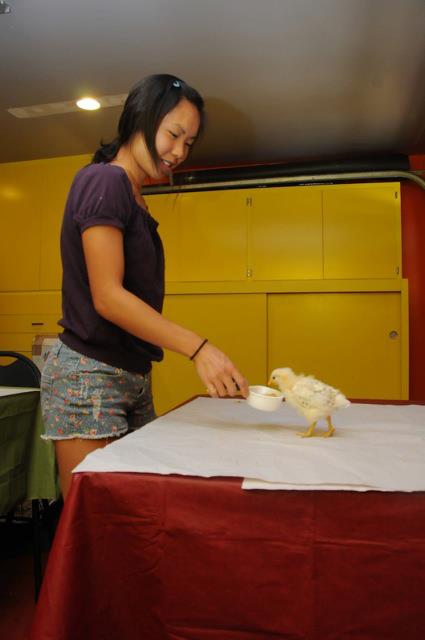My Time With Dr. Yin
 Friday, May 29, 2015 at 05:29PM
Friday, May 29, 2015 at 05:29PM
This is a powerful piece about Sophie's very personal experience with Dr. Sophia Yin. Sophie Liu - Cornell V:50 I:4 Experiences 2nd Place Loss is a deeply complicated experience, one founded in sweet memories and buttressed by bittersweet realizations. Rarely a day goes by that I do not have vivid flashbacks to my time spent with the late Dr. Sophia Yin. Dr. Yin was my mentor, inspiration, and friend. She was the creative mastermind who helped uncover my deepest passion and guided me on this path towards behavior medicine. In her, I found not only a kindred spirit but also someone who genuinely cared for me and urged me to try harder than the last time. If it wasn’t readily apparent by all the free educational material displayed on her website, it also goes without saying that Dr. Yin poured her soul into her work, and she percolated with sage insight, freely flowing to every hungry apprentice who was willing to meet her rigorous standards. I’m not sure how many high school, college, or veterinary students are lucky enough to find a mentor this remarkable, but I was so lucky to have found Sophia Yin.
It is difficult now to reflect on my experiences with Dr. Yin without equal parts elation and profound emptiness. Dr. Yin’s broad reach and ability to straddle the two spheres of animal trainers and veterinary professionals has made her an immensely public figure. Her name is still everywhere, her work is in many of my classes, and her wisdom permeates so much of modern behavior medicine. Yet, the knowledge that she is no longer with us and the understanding that a deep suffering swept her from this world lingers with me, and it coats everything with a veneer of sadness and regret. In veterinary school, we are taught how to manage physical pain. We are taught the neural pathways, instructed to lessen discomfort, and given advice on drug selection. We are taught to ameliorate suffering, to enhance quality of life, and to preserve dignity. But in our quest to control the suffering of creatures in our lives, we sometimes struggle to recognize our own pain and manage the suffering that accumulates with time. We brush aside the frustrations that burden our core each time we experience heartache, destructive criticism, or financial setback. We push on and we fight. But the truth is that we are not unbreakable, and even the giants among us need support. Reach out to your friend, your peer, your mentor, and listen. Ask deep questions, seek help, and, above all, do no harm to yourself, first. The legacy of Dr. Yin and every veterinarian or veterinary student whose untimely passing gave us pause demands that we do so.  "Chickens were meant for eating, not training."From the moment I contacted her as an aimless high school junior to the moment she sent me off to veterinary school, Dr. Yin always relished in “putting me to work” and challenged my knowledge and skills. For my first internship, for example, she decided that a top priority was to expand my training skills to beyond just the canine variety. So, she purchased a small batch of chicks, and I thus began the task of raising and training animals with which I’d only had previous experience eating. Let me assure you – when I was growing up, backyard chickens were not yet popular in urban SF Bay Area. Chickens were meant for eating, not training. Yet, with Dr. Yin’s playful goading and experienced wisdom, I carefully crafted a training plan, documenting each behavioral success with the precision and rigor befitting any respectable scientist. In the end, I never quite trained the complete object discrimination task that we’d planned, but, in my defense, I was also tasked with training the resident cat and the neighbor’s unruly dog in four short weeks. One can only shape so many behaviors in such a short amount of time!
"Chickens were meant for eating, not training."From the moment I contacted her as an aimless high school junior to the moment she sent me off to veterinary school, Dr. Yin always relished in “putting me to work” and challenged my knowledge and skills. For my first internship, for example, she decided that a top priority was to expand my training skills to beyond just the canine variety. So, she purchased a small batch of chicks, and I thus began the task of raising and training animals with which I’d only had previous experience eating. Let me assure you – when I was growing up, backyard chickens were not yet popular in urban SF Bay Area. Chickens were meant for eating, not training. Yet, with Dr. Yin’s playful goading and experienced wisdom, I carefully crafted a training plan, documenting each behavioral success with the precision and rigor befitting any respectable scientist. In the end, I never quite trained the complete object discrimination task that we’d planned, but, in my defense, I was also tasked with training the resident cat and the neighbor’s unruly dog in four short weeks. One can only shape so many behaviors in such a short amount of time!
 Cornell in
Cornell in  Experiences
Experiences 